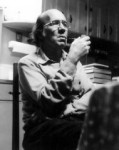The daily email feed from one of the local papers had two links to stories that showed the city’s religious past and present passing each other in ways that could be seen as fitting, if not entirely ironic.
The first headline, listed as a top story: Southern Baptists Shrink For Sixth Straight Year.
The second, which was tabbed under “City News” : Rev. Will D. Campbell Dies At 88.
The declining Southern Baptist Convention (or whatever it’s calling itself these days) might have elicited a sage nod from Reverend Campbell, followed by a pithy, decidedly un-PC observation about the state of the Southern Baptist church. Campbell was nominally a Baptist who was equal parts Jiminy Cricket and a tenacious gadfly towards the conservative religious establishment.
He didn’t mind calling out more public fishers of numbers as opposed to men, the Powers That Be in the SBC and televangelists like Billy Graham and Benny Hinn, referring to them as “Coliseum Isaiahs” and “soul molesters”.
That was just one facet of his ministry. Another facet was the part he played in the civil rights struggle of the 1960s. As a White minister trying to help, he was judicious in his involvement, never overstepping or presuming his own importance. Primary source oral histories show that Campbell was respected, which was nice, and he was trusted by members of the movement at all levels. Given the cultural climate at the time, this says a lot about Reverend Will’s character.
By the rubric used to recognize saints and martyrs in the Anglican tradition, Campbell might very well pass muster as someone deserving of his own day of recognition on the liturgical calendar along with Dr, Martin Luther King and the Martyrs of Memphis. Campbell was indeed saintly, but not by an stretch of the imagination perfect. Every event in his life caused him to confront his own prejudices.
During World War II, Campbell caught himself celebrating the atomic bomb attacks on Japan. He realized that he was celebrating the death of 200,000 people who, if he was to believe his own theology were just as worthy of life in the eyes of his God as he was. It was the same argument he would use throughout his career as a Christian minister and an activist for human rights. This led to his advocacy for the elimination of the death penalty and in a move that surprised those who had a superficial understanding of his philosophy, his ministry to members of the Klu Klux Klan.
To Campbell, there was fine print excluding anyone from Divine Grace. His Christ died on the cross for everyone, no exceptions. He said more than once:
“If you’re going to love one, you’ve got to love ’em all.”
-Reverend Will D. Campbell
That’s a pretty tough ideal to live up to. Still, it’s a worthy one regardless of what path you or I or anyone else may choose. Someone once said they had no respect for Christians who don’t proselytize. I disagree. To me, there are myriad ways to get where we’re supposed to be going. My Jesus might very well be your Balder or her Baal or their Vishnu. What we have to gain from observing the words and actions of Tzadikin Nistarim, the truly holy, is a way for us the be the best whatever-we-are that we can be.
Want to know about Will Campbell?
Here is a list of his books. I recommend “Forty Acres and a Goat”, “Elvis As Redneck,” and “Brother To A Dragonfly” to start.
- Race and the Renewal of the Church (1962)
- Up to Our Steeples in Politics (1970, reprint 2005) (with James Y. Holloway)
- The Failure and the Hope: Essays of Southern Churchmen (1972, reprint 2005) (edited with James Y. Holloway)
- … and the criminals with him …” Lk 23:33: A first-person book about prisons (1972)
- Brother to a Dragonfly (1977): part autobiography, part elegy for Campbell’s brother, part oral history of the Civil Rights Movement
- The Glad River (1982): novel
- Cecelia’s Sin (1983): historical novel set among the early Baptists
- The Lord’s Prayer for Our Time (1983) (with Will McBride and Bonnie Campbell)
- Forty Acres and a Goat (1986): autobiography (40 acres is about 16 hectares)
- The Convention: A Parable (1988): allegory based on the conflict between moderates and fundamentalists within the Southern Baptist Convention
- Covenant: Faces, Voices, Places (1989) (with photographs by Al Clayton)
- Chester and Chun Ling (1989): children’s book, illustrated by Jim Hsieh
- Providence (1992, reprint 2002)
- The Stem of Jesse: The Costs of Community at a 1960’s Southern School (1995, reprint 2002): account of racial integration at Mercer University
- “Little Red Riding: The Babtist Red-headed Girl” (1996, reprinted 2001): children’s book, illustrated by Picasso
- “Elvis Presley as Redneck” (1995): address delivered at First Elvis Presley Symposium, University of Mississippi
- The Pear Tree That Bloomed in the Fall (1996): children’s book, illustrated by Elaine Kernea
- And Also With You: Duncan Gray and the American Dilemma (1997): a tribute to the Rt. Rev. Duncan M. Gray, whom Campbell calls one of his heroes
- Bluebirds Always Come on Sunday (1997)
- Shugah and Doops (1997)
- Soul Among Lions: Musings of a Bootleg Preacher (1999)
- Robert G. Clark’s Journey to the House (2003): a biography of the man who, in 1967, was elected Mississippi‘s first black state legislator since Reconstruction
- “Writings on Reconciliation and Resistance” (2010)
- “Crashing the Idols: The Vocation of Will D. Campbell” (2010)
- “And the Criminals With Him: Essays in Honor of Will D. Campbell and the Reconciled” Edited by Will D. Campbell and Richard C. Goode. (2012)

